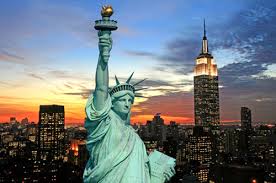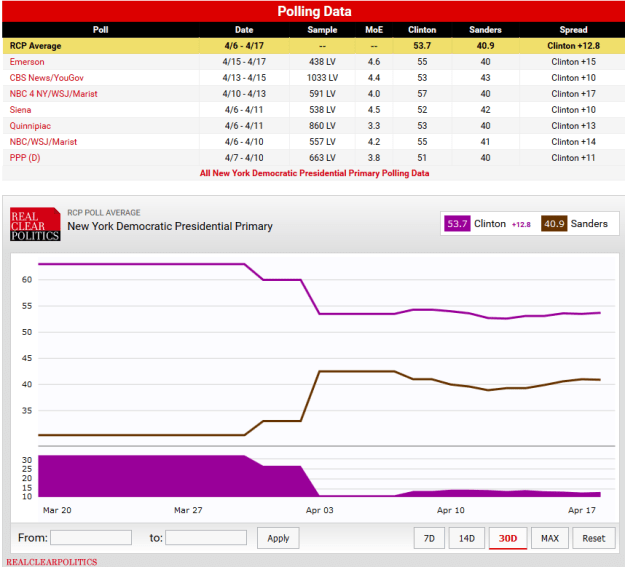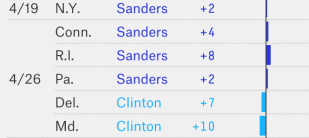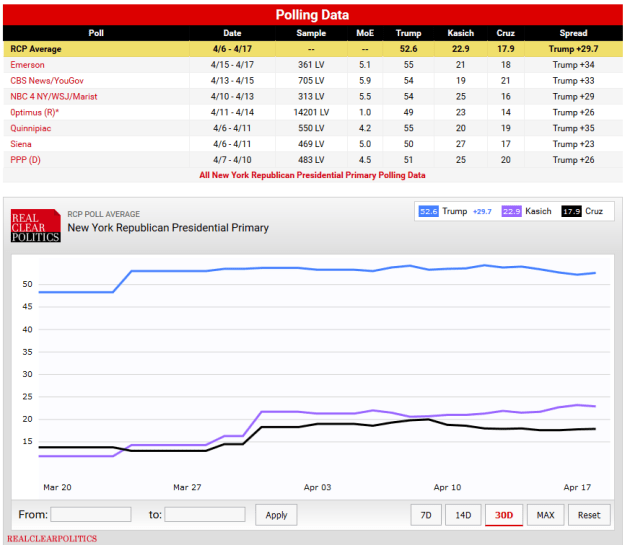
Well, last Tuesday we had New York with 291 delegates on the Democratic side, and today five Northeastern states are up at once with a combined 462 more. This looks like one of those rare times that the preferences of the East Coast will have a major effect on choices the nation makes-28% of all the delegates left in the rest of the race will be chosen by this time tomorrow. Here’s where things stand:
Democrats
First off, hoo-boy was I wrong! I said last week that I thought there were signs that Bernie Sanders was going to do better in New York than the polling seemed to indicate. In fact, he got shellacked in New York 58%-42%, a proportion pretty much matching what the polling averages were indicating.
Looking back, I would say that, whatever traces I thought I was sniffing, I should have been a good data-head and really crunched the numbers, because I was badly under-estimating the effect of New York being a closed primary. It’s been observed that Sanders has drawn a lot of his support from voters who register Independent, who can participate in states that have open primaries, but can’t in states with closed primaries. Indeed, if you crunch the numbers on averages of non-Southern open primaries vs. closed primaries, you find the following:

Sanders wins a narrow majority of total votes in open primaries, but has lost the closed primaries 47-53. All five of today’s states have closed or semi-closed primaries, which means Sanders will not be picking up cross-over voters. Thus, you can probably take the polls that show him facing double-digit losses in Maryland & Pennsylvania at face value. His best bets for the night look like Connecticut and Rhode Island, where he’s narrowly behind:


If he ends up 0-5 on a night when 28% of the remaining delegates are up, that’s not going to silence the voices calling for him to admit the game is up. Narrowly winning 2 of the smaller states, both from his native New England, won’t either. He’ll certainly have the money and the enthusiastic base of supporters to stay in until the end. There’s even an open primary coming up next week, Indiana, and he remains within striking distance in polling of the largest state of all, California. And a decent argument can be made that he should stay in for the good of his movement, and democracy in general. But in terms of realistic chances, the New York blowout made his already up-hill shot even steeper, and tonight is liable to make it steeper still.
Republicans
In a certain sense, the Republican side is much clearer, and in a certain sense, it’s murky as %$#@. After a very strong New York last week, Trump is showing solid leads in all five states tonight, and the Republican delegate rules are liable to expand his haul even further.
But behind the scenes, Cruz continues to have a much better ground game for the nuts and bolts of picking up delegates that are still being chosen in state conventions even after the voting has ended. In the current Republican game of delegate-by-delegate attrition, in which a Trump who hasn’t reached the required 1,237 delegates by the convention could have serious problems thereafter, every bit counts.
And then there’s the alliance! Cruz and Kasich are strategically agreeing to stay out of each other’s way in several of the remaining contests. This may indeed be too little, too late, but it does stand a decent shot of handing Cruz Indiana next week, and getting Kasich several Western States. If it does work, Cruz getting all 57 of the winner-take-all delegates next week could seriously complicate Trump’s remaining math. If it doesn’t, that 57 plus his haul from tonight will probably put Trump on track to get close enough to the 1,237 that the game is, effectively, over.
Stay tuned!











 A History of God (Karen Armstrong)– Because Christian Fundamentalism is such a strong voice in our current culture wars (as well as the boogeyman of Islamic Fundamentalism), it can be easy to equate Fundamentalism with religious belief itself, and to think that it has always been so. One of the very useful things I got from Karen Armstrong’s survey of 4,000 years of Jewish, Christian & Muslim thought about God is just how rich a variety of viewpoints there have been in all three religions, and what an outlier 20th/21st century Fundamentalism is. Traditional religion turns out to have never been all one thing, and God is an idea that continues to evolve as all three faiths grapple with it.
A History of God (Karen Armstrong)– Because Christian Fundamentalism is such a strong voice in our current culture wars (as well as the boogeyman of Islamic Fundamentalism), it can be easy to equate Fundamentalism with religious belief itself, and to think that it has always been so. One of the very useful things I got from Karen Armstrong’s survey of 4,000 years of Jewish, Christian & Muslim thought about God is just how rich a variety of viewpoints there have been in all three religions, and what an outlier 20th/21st century Fundamentalism is. Traditional religion turns out to have never been all one thing, and God is an idea that continues to evolve as all three faiths grapple with it. Answer to Job (Carl Jung)– Jung starts by looking at the Book of Job, and the thundering non-answer God gives Job when questioned about suffering. He then presents the Gospels as God “reconsidering” his answer, with an outpouring of love and self-sacrifice to relive our suffering. However, this is too abrupt a shift from the sometimes judgmental God of the Old Testament, leaving an unintegrated remainder of the capacity for wrath. And thus we get the Book of Revelation… This fascinating examination of the Bible in the context of psychology and mythology opens up whole new ways to understand scripture.
Answer to Job (Carl Jung)– Jung starts by looking at the Book of Job, and the thundering non-answer God gives Job when questioned about suffering. He then presents the Gospels as God “reconsidering” his answer, with an outpouring of love and self-sacrifice to relive our suffering. However, this is too abrupt a shift from the sometimes judgmental God of the Old Testament, leaving an unintegrated remainder of the capacity for wrath. And thus we get the Book of Revelation… This fascinating examination of the Bible in the context of psychology and mythology opens up whole new ways to understand scripture. God : A Biography, Christ: A Crisis in the Life of God (Jack Miles)– In many ways, Miles two books follow up on this approach. But Miles instead approaches scripture from the vantage point of literary criticism, examining what kind of character God, as presented in the Bible, is. The first volume covers the troubled evolution of God’s character in the Old Testament, and the second presents the New Testament as a response to the crisis that God’s character comes to, which is radically resolved through incarnation and sacrifice. Again, coming at things from a fresh direction can break open how the story can reach us today, and what it can mean.
God : A Biography, Christ: A Crisis in the Life of God (Jack Miles)– In many ways, Miles two books follow up on this approach. But Miles instead approaches scripture from the vantage point of literary criticism, examining what kind of character God, as presented in the Bible, is. The first volume covers the troubled evolution of God’s character in the Old Testament, and the second presents the New Testament as a response to the crisis that God’s character comes to, which is radically resolved through incarnation and sacrifice. Again, coming at things from a fresh direction can break open how the story can reach us today, and what it can mean. Rescuing the Bible from Fundamentalism: A Bishop Rethinks the Meaning of Scripture (John Shelby Spong)– A (now retired) Episcopalian Bishop, Spong made it his life’s work to consider what scripture can mean in the age of science. He points out that a literal understanding as modern Fundamentalism thinks of it is actually a very modern phenomenon, and would have made no sense, for example, to medieval Jewish Rabbis, or classic theologians like St. Augustine. The Bible, he contends, can and should be understood in its original cultural and historical setting, and considered in light of what its essential meaning is in our current setting.
Rescuing the Bible from Fundamentalism: A Bishop Rethinks the Meaning of Scripture (John Shelby Spong)– A (now retired) Episcopalian Bishop, Spong made it his life’s work to consider what scripture can mean in the age of science. He points out that a literal understanding as modern Fundamentalism thinks of it is actually a very modern phenomenon, and would have made no sense, for example, to medieval Jewish Rabbis, or classic theologians like St. Augustine. The Bible, he contends, can and should be understood in its original cultural and historical setting, and considered in light of what its essential meaning is in our current setting. Stalking Elijah (Rodger Kamenetz)– In his earlier book, The Jew in the Lotus, Kamenetz described the journey from his Jewish upbringing to Buddhism. After it came out, the Dalai Lama challenged his to search for practices of mindfullness in his own spiritual tradition. His resulting talks with several contemporary Jewish mystics uncovers a lively and longstanding tradition of mystical contemplation in Judaism. It turns out that being a Jew and a Buddhist aren’t necessarily as different as one might think…
Stalking Elijah (Rodger Kamenetz)– In his earlier book, The Jew in the Lotus, Kamenetz described the journey from his Jewish upbringing to Buddhism. After it came out, the Dalai Lama challenged his to search for practices of mindfullness in his own spiritual tradition. His resulting talks with several contemporary Jewish mystics uncovers a lively and longstanding tradition of mystical contemplation in Judaism. It turns out that being a Jew and a Buddhist aren’t necessarily as different as one might think… The Coming of the Cosmic Christ (Matthew Fox)– Fox, like Spong, sought to bring new understanding to the church from within, but met with a little more resistance, ultimately resulting in him being expelled as a priest from the Dominican Order of the Catholic Church. One of the key points of the schism was his rejection of the idea of “original sin”, instead focusing on the original blessing of creation, and how a church focused on this can atone for its own sins against women, the unempowered, other faiths, etc. and develop an ecologically-centric, globally-minded and gender-balanced idea of what Christ represents. As Fox says, “The power of native religions to regenerate Christianity and to reconnect the old religion with the prophetic Good News of the Gospels has yet to be tapped.”
The Coming of the Cosmic Christ (Matthew Fox)– Fox, like Spong, sought to bring new understanding to the church from within, but met with a little more resistance, ultimately resulting in him being expelled as a priest from the Dominican Order of the Catholic Church. One of the key points of the schism was his rejection of the idea of “original sin”, instead focusing on the original blessing of creation, and how a church focused on this can atone for its own sins against women, the unempowered, other faiths, etc. and develop an ecologically-centric, globally-minded and gender-balanced idea of what Christ represents. As Fox says, “The power of native religions to regenerate Christianity and to reconnect the old religion with the prophetic Good News of the Gospels has yet to be tapped.” The Gospel According to Jesus (Stephen Mitchell)– Starting in the 19th Century and accelerating into the 20th, there has been a lot of scholarship based on archaeology, literary study and the latest discoveries of ancient texts on who the historical Jesus was, and what his original teachings may have been vs. what is later accretion by the Church as it grew. Mitchell wrote this book in an attempt to make that scholarship more available to a lay-audience. He also puts Jesus’ teachings in the context of spiritual traditions from around the world. This book had a profound impact on me when I first read it, unlocking a vitality and compassion in the Gospel message that is all too easily obscured by dogma and history at this point.
The Gospel According to Jesus (Stephen Mitchell)– Starting in the 19th Century and accelerating into the 20th, there has been a lot of scholarship based on archaeology, literary study and the latest discoveries of ancient texts on who the historical Jesus was, and what his original teachings may have been vs. what is later accretion by the Church as it grew. Mitchell wrote this book in an attempt to make that scholarship more available to a lay-audience. He also puts Jesus’ teachings in the context of spiritual traditions from around the world. This book had a profound impact on me when I first read it, unlocking a vitality and compassion in the Gospel message that is all too easily obscured by dogma and history at this point. The Jesus I Never Knew (Philip Yancey)– Yancey’s book actually does something very similar, but from a diametrically opposite direction. Yancey is a mainstream Evangelical author, but he takes the gospel message down to its fundamentals, and lets every challenging thing that Jesus asked of his followers stand in sharp relief. Again, as with Mitchell, this has a way of cutting through history and dogma, and re-revealing how radical the message of Jesus really was, and remains today.
The Jesus I Never Knew (Philip Yancey)– Yancey’s book actually does something very similar, but from a diametrically opposite direction. Yancey is a mainstream Evangelical author, but he takes the gospel message down to its fundamentals, and lets every challenging thing that Jesus asked of his followers stand in sharp relief. Again, as with Mitchell, this has a way of cutting through history and dogma, and re-revealing how radical the message of Jesus really was, and remains today. The Left Hand of God: a Biography of the Holy Spirit (Adolf Holl)– In the fine tradition of Fox, Holl is a Catholic writer and theologian who served as a priest and professor of Theology for almost 20 years until he was dismissed due to conflicts with church authorities. They may dismiss him, but I found his biography of the Holy Spirit to be very arresting. He looks at the third “person” of the traditional Christian Trinity through its affect on a variety of inspired figures throughout history, including Catholic saints, founders of alternate religions, U.S. Pentecostals and Malcom X. This approach leaves the Spirit as it should be, very much alive and active in the world.
The Left Hand of God: a Biography of the Holy Spirit (Adolf Holl)– In the fine tradition of Fox, Holl is a Catholic writer and theologian who served as a priest and professor of Theology for almost 20 years until he was dismissed due to conflicts with church authorities. They may dismiss him, but I found his biography of the Holy Spirit to be very arresting. He looks at the third “person” of the traditional Christian Trinity through its affect on a variety of inspired figures throughout history, including Catholic saints, founders of alternate religions, U.S. Pentecostals and Malcom X. This approach leaves the Spirit as it should be, very much alive and active in the world.